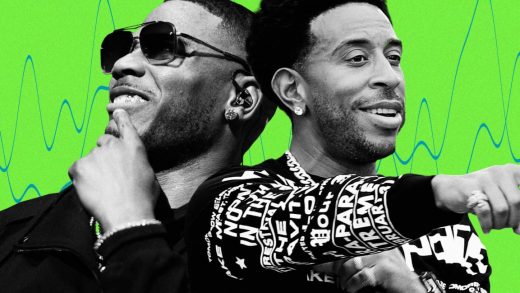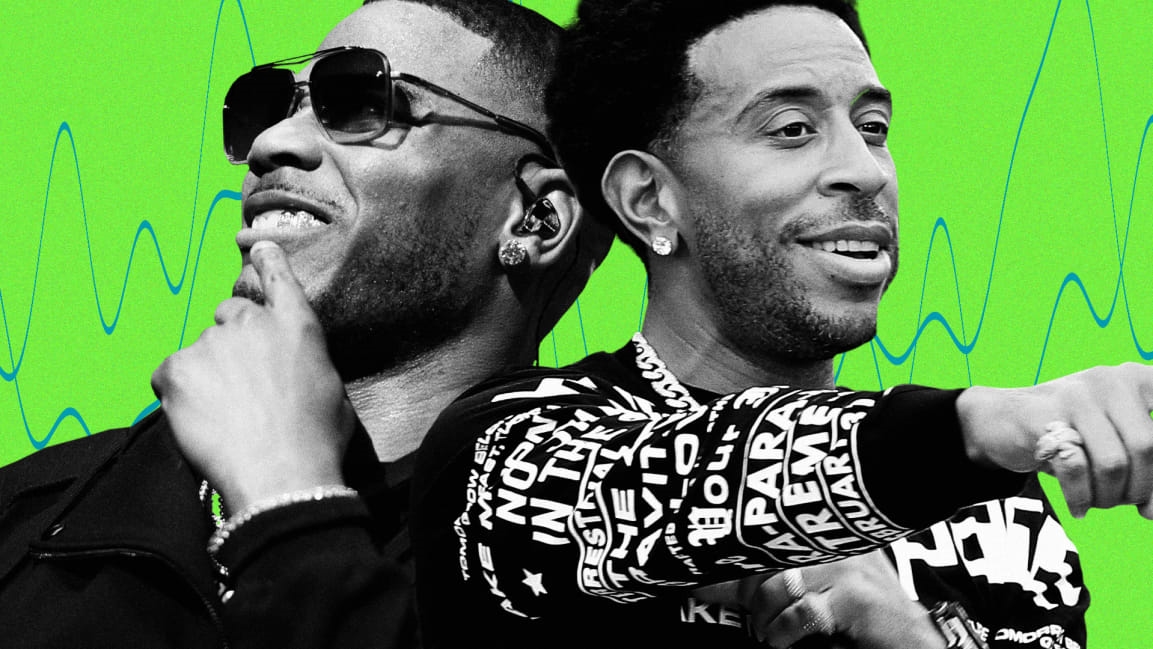Everything you need to know about Ludacris and Nelly before their Verzuz Instagram battle
Ludacris and Nelly will be the next pair of hip-hop giants to go round for round in #Verzuz. Set your reminders for Saturday, May 16, at 7 p.m. ET for another legendary pairing.
These pop-rap hitmakers ushered in the 21st century with a slew of hits that were the perfect party anthems to sum up the formative years of now-grown-up millennials who were experiencing either high school or college back then. That was a time when drinking Hpnotiq was cool, airbrushed customizations on clothes were considered stylish, velour was an acceptable material for a tracksuit, and throwback jerseys three sizes too big were all the rage in fashion.
Ludacris and Nelly’s respective reigns marked a time when hip-hop was transitioning from what hip-hop historians consider the golden era (the 90s) into uncharted territory. Ludacris was part of the first crop of Southern rappers exposing the mainstream to a sound known as crunk, with bouncy bass-driven beats; easy-to-chant-along, command-driven hooks; and his cheeky wordplay and comical concepts.
Nelly’s rhymes were simple and singsongy. He literally took nursery rhymes and made them danceable, with infectious melodies and rhythms that even the most hardcore hip-hop purists couldn’t resist on the dance floor. Even Jay-Z couldn’t deny Nelly’s impact, and in 2002’s “Excuse Me Miss” he rapped, “Only dudes movin’ units—Em, Pimp Juice, and Us.” That’s Eminem, Nelly (whose single “Pimp Juice” was making waves at that time), and of course Jay’s Roc-a-fella crew.
Jay-Z didn’t mention Ludacris in that line, but Luda was still a force.
Both Ludacris and Nelly wracked up megahits galore, consistently landed singles at the top of the most popular charts, and won multiple awards (Grammys, Billboard Awards, and so forth).
In the beginning, they were unlikely candidates for long-term success, but they proved that they had crossover appeal in different ways and turned hip-hop on its head by setting the standard for a more singles-driven industry—even though many people didn’t realize that that was where music was headed at the time.
On Saturday night, they will face off in a battle that’s really more like a celebration.
Here’s what you need to know ahead of the showdown.
Origin stories
Ludacris (born Christopher Bridges) made his major-label debut in 2000, around the same time Southern hip-hop had also gone pop. The Atlanta native began interning at Hot 97.5 (which later became Hot 107.9) when he was in college at Georgia State, worked his way up the ranks, and became an on-air DJ. At that time he was known as DJ Chris Lova Lova, and he used his stint at the radio station to make connections in the music industry and pursue rap.
He struck up a friendship with superproducer Timbaland, who put him on his 1998 single “Fat Rabbit.” From there, Ludacris continued making a name for himself as an underground rapper and recorded and released his first album, Incognegro (1999). It was an indie regional release on Luda’s label, Disturbing Tha Peace. With it, he got the attention of Def Jam and became one of the faces of Def Jam South.
Def Jam South repackaged Incognegro as Back for the First Time, added a few new songs, and released that version of it in 2000. The album’s lead single, “What’s Your Fantasy?,” became a national hit and peaked at No. 21 on the Billboard Hot 100. The follow-up single, “Southern Hospitality,” received similar acclaim. Luda’s follow-up album, Word of Mouf (2001), was an even bigger success, spawning a series of hit singles such as “Area Codes,” “Rollout (My Business),” “Saturday (Oooh Oooh!),” “Welcome to Atlanta,” and “Move B**ch.”
Luda remained consistent throughout the decade. In 2002, he released Golden Grain, an ensemble album showcasing talent signed to Disturbing Tha Peace (but now in partnership with Def Jam). He appeared in the film 2 Fast 2 Furious the following year, in a role that he would eventually reprise throughout the franchise, and he went on to have a robust acting career while still putting out music and embarking on other business ventures. His last album, Ludaversal, came out in 2015 and also received critical acclaim. He’s more actor than rapper these days, but he has been consistent since he stepped on to the mainstage.
Nelly (born Cornell Hayes Jr.) seemed like the classic case of a one-hit wonder when he debuted in 2000 with “Country Grammar (Hot…).” However, the St. Louis native quickly established himself as a force with his catchy, singsongy hooks and melodic rhymes that were key elements of what would become his signature style and the components of several top-charting hits.
Being from the Midwest at a time when hip-hop was dominated by the South and then the east and west coasts also helped him stand out, as Nelly didn’t sound like anyone else. His hometown informed his style, and he made it a point to teach the world his dialect and twang. “Country Grammar (Hot…)” became a summer anthem, and several hits followed over the course of the following decade. Nelly’s debut album, Country Grammar (2000), debuted at No. 3 on the Billboard 200 chart and spawned the hit singles “E.I.,” “Ride With Me,” and “Batter Up.”
Nelly’s next album was a collaboration with his crew, the St. Lunatics, released in 2001, and then he returned with another solo album in 2002. Over the course of the beginning of the 21st century, Nelly gave pop culture “Air Force Ones,” an ode to the classic sneaker that had already been a staple for sneakerheads; “Dilemma,” a melodramatic syrupy sweet duet with Kelly Rowland; “Over and Over,” a collaboration with Tim McGraw; “Flap Your Wings”; and more.
THIS IS VERZUZ !!!!!! Sat get ready people 7pm est @Ludacris @Nelly_Mo @therealswizzz @sunbronx ???? @verzuztv pic.twitter.com/mem18D9EMk
— Timbaland (@Timbaland) May 14, 2020
Signature styles
Ludacris had a uniquely witty approach to rhyming. He excelled at wordplay and playing with a variety of cadences. His delivery was often exaggerated and overenunciated, almost as if a comedian had decided to start rapping mid-standup, which sometimes overshadowed the fact that he is a highly skilled lyricist and storyteller.
Nelly never fit into the lyrical category from a purist standpoint. He was known for simple rhymes, melodic oratorio, and memorable hooks. Nelly was a rap-singer who was good at writing songs.
Both men had some of the most creative concepts for their time.
A homie says that he doesn’t believe that Ludacris is lyrical. That he makes good songs, but that he’s not lyrical. What do y’all think?
— William Ketchum III (@WEKetchum) May 10, 2020
I think Ludacris is seriously underrated. And Nelly is too. I saw him perform live w/ The Roots’ band and I almost cried. It was amazing. BOTH are top contributors to the culture, for sure.
— Queen Boowee (@msboowee) May 14, 2020
Nelly (@Nelly_Mo) explains why the FIRST LINE of a song can make or break the entire listening experience. (via @TheFader) pic.twitter.com/qv2pSjiGL6
— DJBooth (@DJBooth) May 14, 2020
Crew love
Crews were a lot more standard in the ’90s and early ’00s than they are now.
Nelly had the St. Lunatics, which was a collective of his actual friends. He tried to get a record deal with them as a group, but ultimately it was decided that he would have a better chance at solo success—and he did. But he brought them with him once he got successful.
Luda’s Disturbing Tha Peace served as a record label and a collective. There were several artists on the label who weren’t hometown friends, but they appeared to be a cohesive unit and often featured on each other’s songs. Notable DTP artists included Shawnna, Field Mob, and Chingy.
Crunk anthems
Nelly’s music technically wasn’t crunk. He was definitely standard hip-pop, but he and Ludacris mastered the art of making fun music, and it all got lumped together at social events and on music charts. Both had hits that dominated the club scene worldwide, and they both managed to put perceptible names on esoteric dances that ended up becoming international movements.
Luda’s “Southern Hospitality” taught the world how to throw bows. It’s a dance born out of the concept of being in an overcrowded place or generally needing space—think along the lines of trying to move around in the middle of a crowded club or playing basketball and needing defense to get off your bumper.
What better way to get people around you to give you space than by swinging your elbows?
In Nelly’s “Flap Your Wings,” he commands, “Drop down and get your eagle on, girl!” That line was a take on the concept of “dropping it low.” It was a move people had been doing since knees were a thing, but Nelly just updated its name and gave it more of a visual representation with a video that featured women dancing around in carnival costumes adorned with feathers and jewels.
Business titans
Both men have made lucrative deals throughout their careers that have had a lasting impact on their lives and also on how other rappers do business. Ludacris scored with acting by becoming a regular as Tej in the Fast and Furious franchise, appearing in such other movies as Hustle & Flow and Crash, and doing voiceover work in The Simpsons, Doc McStuffins, and more. He launched a line of noise-canceling headphones called Soul and a cognac called Conjure. He also did commercial work, as the voice of Radio Shack (RIP), and had a lucrative but short-lived deal with Pepsi. Ludacris lost that endorsement with Pepsi due to being targeted by then-Fox News host Bill O’Reilly, but that is another (long) story.
Nelly did some substantial acting with roles in Snipes, CSI: NY, The Longest Yard, Real Husbands of Hollywood, and more. He released a limited-edition sneaker called Air Derrty with Nike (which was a remake of Charles Barkley’s retro shoe with the brand), signed a deal for sneakers with Reebok, launched Pimp Juice (an energy drink named after his song of the same name), worked with Mike & Ike (the candy), has a fitness DVD, and purchased a minority stake in the NBA’s Charlotte Bobcats.
Most notably, in 2003, Nelly launched Apple Bottoms—a clothing line geared toward women. Apple Bottoms jeans, in particular, did extremely well. Several rappers have referenced them in their music, and they were one of the most-googled denim brands in 2006. The brand’s last ad campaign ran in 2010, and then it shuttered, but in early March 2020 Nelly took to his Instagram page to announce that he was bringing it back this year. That was prequarantine, so we’ll see how that goes.
Fashion
Both men reveled in the interesting fashion choices of that time and influenced (possibly questionable) sartorial choices that millennials would soon rather forget, so it’s only right that we explore what that looked like, thanks to jokes from Twitter.
This how me and the squad pullin up to Nelly vs Ludacris next week pic.twitter.com/TC4GuwTVKn
— dontcomeforthedon (@dayothegemini) May 10, 2020
If she and her homegirls don’t pull up like this to Nelly vs Ludacris next week, we ain’t letting them in! pic.twitter.com/9LAgCiOfqx
— dontcomeforthedon (@dayothegemini) May 10, 2020
Picking out my fit For Nelly Vs Ludacris pic.twitter.com/FPX8vz8q2i
— Trey Mysterio ???? ???????? (@__SpeedDemon__) May 10, 2020
im ready for ludacris vs nelly pic.twitter.com/qNdHmOcvVe
— ???????????????????????????????????????? ??? (@ihatescorpios) May 10, 2020
How I’m pulling up to Ludacris vs. Nelly next Saturday pic.twitter.com/mSJzvB9BTN
— BreAnna Bell (@bre_blogs) May 10, 2020
Nelly and Ludacris battling ? Got my outfit ready pic.twitter.com/5iP7hMBsoB
— zilla ???? (@labellaZILLA) May 10, 2020
me showing up to the Ludacris/Nelly battle pic.twitter.com/RXHDVASlv7
— ??????? (@ceetron) May 10, 2020
Finally, here are some playlists for your listening pleasure.
And here’s a Nelly one on Tidal.
Fast Company , Read Full Story
(13)



